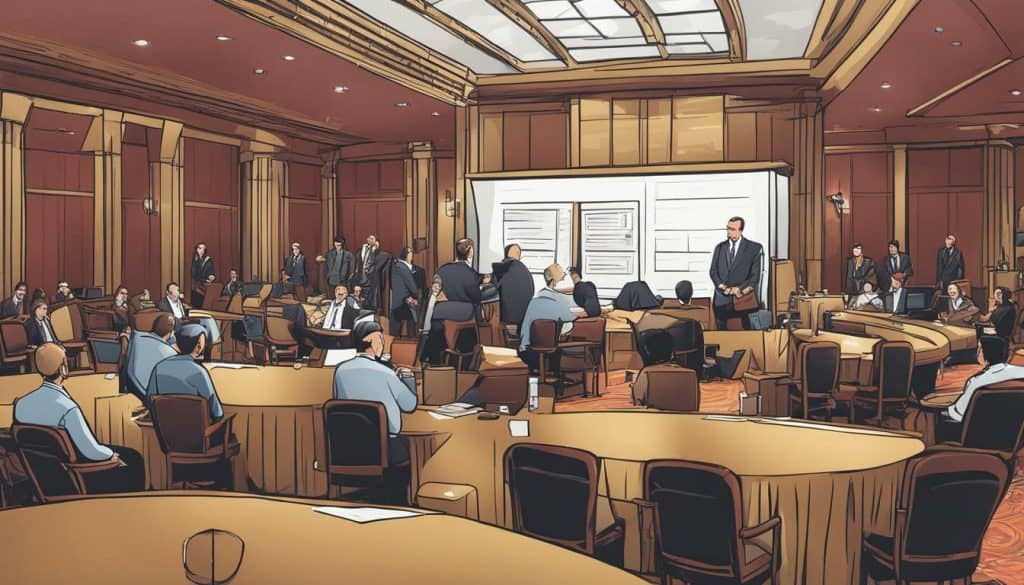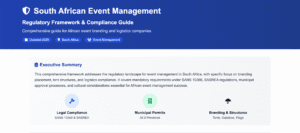Venue selection and management play a critical role in the success of any event. Choosing the right venue is essential for creating the right atmosphere, accommodating your audience, and ensuring smooth logistics. In this section, we will explore the key factors to consider when selecting a venue and how to effectively manage it throughout the event planning process.
- Consider factors such as indoor/outdoor space, audience capacity, duration, and accessibility when selecting a venue.
- Research potential venues by contacting government agencies, consulting industry bodies, and utilizing resources like the Yellow Pages.
- Conduct site visits to assess the suitability of venues in terms of dimensions, environment, facilities, position, and cost.
- Negotiate price and terms, and sign a contract to secure the booking.
- Check for any changes and plan event logistics accordingly.
Now, let’s dive deeper into the world of venue selection and management to ensure your next event is a resounding success!
Factors to Consider in Venue Selection
When choosing a venue for your event, there are several factors you need to carefully consider. These factors will determine the success of your event and the overall experience of your attendees. Here are some key aspects to keep in mind during the venue selection process.
- Indoor/Outdoor Space: Consider whether you need an indoor or outdoor venue based on the type of event you’re planning. Outdoor venues provide a natural ambiance and are ideal for activities like weddings or concerts. Indoor venues, on the other hand, offer more control over the environment and are suitable for conferences or trade shows.
- Audience Capacity: Determine the size of your audience and choose a venue that can comfortably accommodate them. It’s important to have enough space for attendees to move around and engage in activities without feeling overcrowded or cramped.
- Duration of the Event: Evaluate the duration of your event and ensure that the venue can accommodate your needs. Some venues may have limitations on event hours, so it’s crucial to select a venue that aligns with your event schedule.
- Accessibility: Consider the accessibility of the venue for your attendees. Are there public transportation options nearby? Is there sufficient parking available? Accessibility is crucial to ensure that your event is easily reachable and convenient for all attendees.
Researching potential venues is an essential step in finding the perfect location for your event. Contacting government agencies, consulting industry peak bodies, and using resources like the Yellow Pages can provide valuable information about available venues. It’s important to gather as much information as possible to make an informed decision. Once you have a shortlist of venues, it’s time to visit them to assess their suitability.
During the site visits, focus on various factors to determine if the venue meets your requirements. Pay attention to the dimensions of the space, ensuring that it can comfortably accommodate your event setup. Assess the environment and ambiance of the venue to ensure it aligns with the desired atmosphere for your event. Evaluate the available facilities, such as audiovisual equipment, seating arrangements, and restroom facilities. Consider the venue’s position and accessibility for logistics planning and attendee convenience. Lastly, factor in the cost of the venue to ensure it fits within your event budget.
By carefully considering these factors and conducting thorough research and site visits, you can select a venue that meets your event’s needs and delivers an unforgettable experience for your attendees.

To find the perfect venue for your event, it’s crucial to conduct thorough research. There are various methods you can employ to ensure you find the most suitable options. Start by reaching out to government agencies or industry peak bodies, as they often have valuable information on available venues. Additionally, online resources like the Yellow Pages can provide a comprehensive list of venue management companies and services in your area.
Another effective method is to consult with event planners or professionals who have experience in venue selection. They can offer recommendations based on their previous experiences and may have contacts within the industry that can help you find the right venue.
Once you have compiled a list of potential venues, it’s advisable to visit each one in person. This will give you a better understanding of the venue’s dimensions, facilities, and overall environment. It’s important to assess whether the venue aligns with your event’s vision and requirements. Take note of important factors such as the venue’s position, available parking options, and accessibility by public transport.
To assist you in your research, here is a table summarizing the key steps involved in researching potential venues:
| Research Method | Benefits |
|---|---|
| Contacting government agencies and industry peak bodies | Access to valuable information and resources |
| Consulting with event planners or professionals | Expert recommendations and industry contacts |
| Visiting potential venues in person | Assessing suitability and understanding venue features |
Remember, thorough research is key to finding the perfect venue for your event. Take the time to gather all the necessary information and make informed decisions that will contribute to the success of your event.

Sample Table:
| Factors to Consider | Evaluation |
|---|---|
| Dimensions | Ensure adequate space for attendees and setups |
| Environment | Assess ambiance, decor, and overall aesthetics |
| Facilities | Check for necessary amenities and backstage areas |
| Position | Evaluate location and accessibility for attendees |
| Cost | Determine if it aligns with your budget |

After finding the ideal venue for your event, the next step is to negotiate the terms and sign a contract. This crucial phase ensures that both parties are in agreement regarding the rental details and helps secure the booking. Negotiating effectively can lead to favorable terms and cost savings for your event.
During the negotiation process, consider the following:
- Price: Explore different pricing options and compare them to your budget. Don’t hesitate to negotiate for a better rate or package deal.
- Terms and Conditions: Review all the clauses in the contract carefully. Look for any hidden charges, cancellation policies, or restrictions that may affect your event.
- Flexibility: Discuss the possibility of modifying certain aspects, such as event dates, set-up time, or decoration policies.
Once both parties have reached an agreement, it is essential to formalize the arrangement by signing a contract. This legally binds both you and the venue, providing you with peace of mind and ensuring that all parties are committed to the agreed-upon terms.
Remember to carefully read and understand the contract before signing, paying attention to all the details. If you have any concerns or questions, seek clarification from the venue management. By signing the contract, you secure your event’s venue and protect yourself from any potential complications.
Sample Contract
“We, [Your Name/Organization], agree to lease [Venue Name], located at [Venue Address], for the purpose of hosting [Event Name] on [Event Date]. The agreed rental fee for the venue is [Price] to be paid in [Payment Terms], with a security deposit of [Amount].”
“The event will take place from [Start Time] to [End Time]. [Your Name/Organization] agrees to adhere to all venue policies and regulations, including those related to noise restrictions, venue capacity, and insurance requirements.”
“Both parties acknowledge and agree to the terms stated in this contract and understand that any violation may result in penalties or termination of the agreement.”
“Signed, [Your Name/Organization] and [Venue Representative]. Date: [Date].”
Table: Checklist for Contract Negotiation
| Considerations | Actions |
|---|---|
| Review Pricing | Compare prices and negotiate for favorable rates. |
| Terms and Conditions | Carefully review the contract for any hidden charges or restrictions. |
| Flexibility | Discuss the possibility of modifying certain aspects to better suit your needs. |
| Read before Signing | Thoroughly read the contract and seek clarification if needed. |
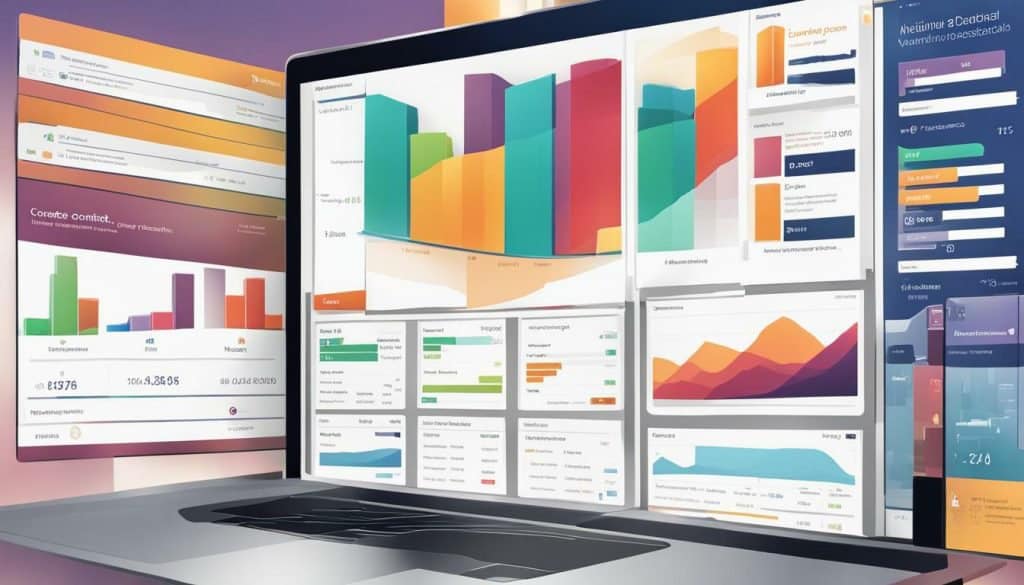
Once the venue is booked, it’s crucial to stay in touch and make additional site visits to ensure everything is on track. Conducting further visits allows you to check for any changes or updates to the venue that may impact your event planning. These visits are also an opportunity to fine-tune logistics and ensure that all aspects of your event run smoothly.
During these site visits, pay attention to any modifications made to the venue, such as renovations or changes in layout. This information can help you plan your event’s setup and make any necessary adjustments. Take note of any alterations to the facilities or amenities provided by the venue, ensuring they align with your event requirements.
Additionally, managing logistics is crucial for a successful event. Consider factors such as parking options, accessibility, and transportation for attendees. If the venue is located in a busy area, it’s essential to plan and communicate alternative transportation methods to ensure guests can reach the event easily.
By staying proactive and conducting regular site visits, you can address any changes or obstacles promptly and ensure your event runs smoothly. Plan logistics meticulously, as even the smallest details can make a big difference in creating a memorable experience for your attendees.
Considering Services and Amenities
Apart from the physical aspects of the venue, it’s essential to consider the services and amenities provided. These additional features can greatly enhance the overall experience for both event organizers and attendees. When selecting a venue, be sure to inquire about the various services and amenities they offer.
One important aspect to consider is WiFi and internet access. In today’s digital age, it’s crucial to have a reliable internet connection for seamless communication, live streaming, and online interactions during the event. Check if the venue provides high-speed WiFi or if you need to make arrangements for additional internet services.
Another important consideration is parking options. Ensure that the venue has sufficient parking space to accommodate your attendees. If not, explore alternative parking arrangements nearby and inform your guests in advance. Additionally, inquire about any parking fees or restrictions that may apply.
The layout and ambiance of the venue are also significant factors to consider. The venue should have a layout that aligns with the flow and requirements of your event. Whether you need separate spaces for networking, presentations, or dining, ensure that the venue can accommodate your specific needs. The ambiance of the venue should also be suitable for the atmosphere you want to create. This includes factors such as lighting, decorations, and overall aesthetics.
| Services and Amenities | Details |
|---|---|
| WiFi and Internet Access | Check if the venue provides high-speed WiFi or if additional internet services need to be arranged. |
| Parking Options | Ensure the venue has sufficient parking space or explore alternative parking arrangements nearby. |
| Layout and Ambiance | Ensure the venue layout aligns with the flow and requirements of your event, and that the ambiance matches your desired atmosphere. |
As an event planner, you also need to consider insurance requirements. Determine if the venue has insurance coverage for any unforeseen incidents. If not, you may need to arrange event insurance to protect yourself, your staff, and the attendees. It’s important to have clarity on this matter before finalizing the venue.
Remember, services and amenities can greatly impact the overall experience of your event. By taking the time to consider these factors, you can ensure that the venue you choose aligns with your event goals and provides a positive experience for everyone involved.
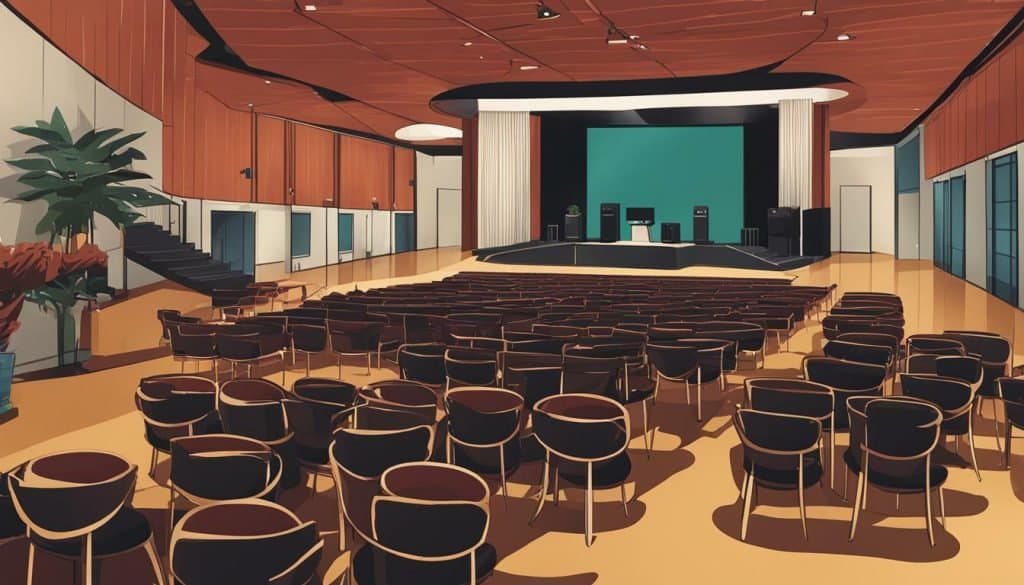
The location and accessibility of the venue can greatly impact the success of your event. When selecting a venue, it is important to consider its proximity to public transportation and the target audience. This ensures that attendees can easily reach the venue, enhancing convenience and attendance rates. Additionally, a well-connected location can attract more attendees from different areas, expanding the event’s reach and potential impact.
Consider the accessibility of the venue by different modes of transport, including buses, trains, and taxis. Is there ample parking available for those who choose to drive? These factors are crucial in ensuring that attendees can easily and conveniently access the event.
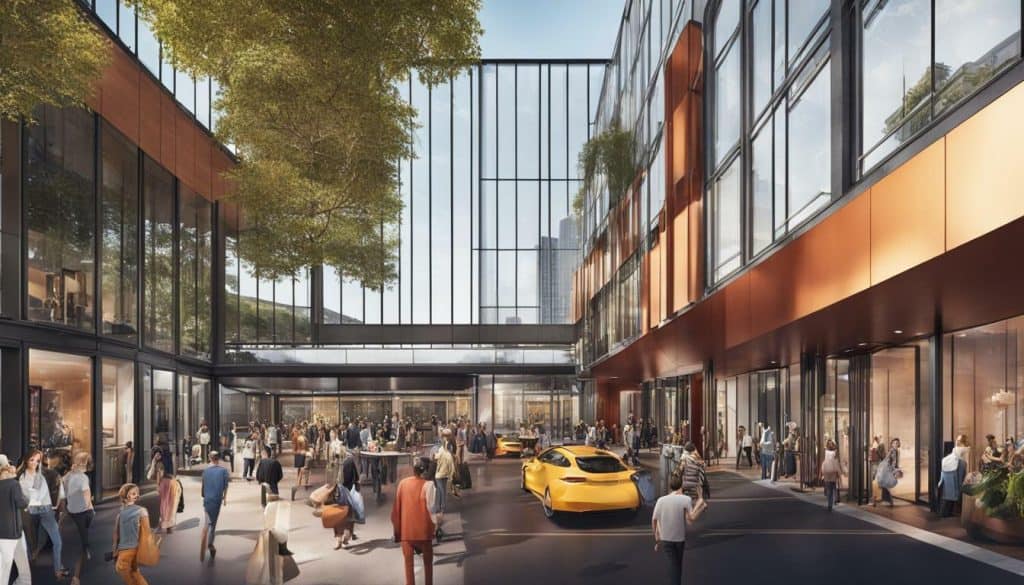
| Location | Accessibility |
|---|---|
| Downtown | Walking distance from public transportation |
| Suburbs | Accessible by car and public transportation |
| Near airport | Convenient for out-of-town attendees |
In addition to location and accessibility, it is essential to consider the capacity and minimums of the venue. This ensures that the venue can accommodate your expected number of attendees comfortably. Check if the venue offers WiFi and internet access to provide a seamless online experience for both organizers and participants. Parking options should also be considered, especially if the event is expected to attract attendees who will be driving. Assessing the layout and ambiance of the venue is important as well, as it contributes to the overall atmosphere and impression of the event.
“The right venue can create the perfect backdrop for your event and leave a lasting impression on your attendees. Consider the accessibility and location when selecting a venue to ensure a successful event.”
Finally, don’t forget to review insurance requirements to ensure that both the venue and your event are adequately covered. This will protect you from any liabilities or unforeseen incidents that may occur during the event.
By carefully considering the location and accessibility of the venue, you can make sure that your event is easily accessible and appealing to attendees. Remember to assess capacity, WiFi access, parking options, layout, ambiance, and insurance requirements to ensure a successful event.
Conclusion
Selecting the right venue is crucial for the success of your event, and effective management ensures a smooth execution from start to finish. As you embark on the venue selection process, consider several key factors to make an informed decision. Think about the event’s need for indoor or outdoor space, ensuring that it aligns with your vision and the requirements of your program.
Another crucial consideration is audience capacity, as you want to ensure that the venue can comfortably accommodate all attendees. Additionally, carefully evaluate the duration of your event and the accessibility of the chosen venue by public transport, making it convenient for everyone to reach.
Researching possible venues can be a daunting task, but utilizing resources like government agencies, industry peak bodies, and the Yellow Pages can provide valuable insights. Once you have narrowed down your options, schedule site visits to assess the venue’s suitability. Pay close attention to dimensions, environment, facilities, position, and cost to determine if it aligns with your event requirements.
Negotiating and signing a contract are crucial steps in securing your chosen venue. Take the time to negotiate price and terms, ensuring that both parties are satisfied with the agreement. Signing a contract not only provides peace of mind but also safeguards your booking.
Throughout the planning process, regularly check for any changes or updates to the venue by conducting further site visits. This will allow you to adapt and plan event logistics accordingly. Consider the services and amenities offered by the venue, such as WiFi and internet access, parking options, layout and ambiance, and insurance requirements. These elements can greatly enhance the experience for both you and your attendees.
In conclusion, venue selection and management play a vital role in event planning. By carefully considering all the necessary factors and following a systematic approach, you can ensure that your event is held in the perfect location and executed flawlessly. Remember, a well-chosen venue sets the foundation for a truly memorable event.
FAQ
What factors should I consider when selecting a venue for an event?
When selecting a venue, it is important to consider factors such as indoor/outdoor space, audience capacity, event duration, and accessibility by public transport.
How can I research potential venues?
You can research potential venues by contacting government agencies, consulting industry peak bodies, and utilizing resources like the Yellow Pages.
What should I assess during a site visit to a venue?
During a site visit, you should assess the suitability of the venue in terms of dimensions, environment, facilities, position, and cost.
How do I negotiate and sign a contract with a venue?
You should conduct negotiations to agree on price and terms, and then sign a contract to secure the booking.
Should I check for any changes or updates to the venue?
Yes, further site visits should be made to check for any changes and plan event logistics accordingly.
What services and amenities should I consider when selecting a venue?
You should consider services and amenities such as WiFi and internet access, parking options, layout, ambiance, and insurance requirements.
How important is the location and accessibility of a venue?
Location and accessibility are significant factors to consider when selecting a venue. Proximity to public transportation and the target audience should be taken into account.
Why is venue selection and management important in event planning?
Venue selection and management are crucial for a successful event. Choosing the right venue sets the tone and atmosphere, accommodates the audience, and ensures logistical requirements are met.
What Role Does Event Management Play in Venue Selection and Management in South Africa?
The goal of event management south africa is to ensure seamless coordination between venue selection and management. Event management professionals in South Africa carefully analyze the requirements of the event and choose an appropriate venue that aligns with the client’s objectives. Effective management of the chosen venue is essential to deliver a successful event, including logistical arrangements, vendor coordination, and attendee experience.
Considering Services and Amenities
Apart from the physical aspects of the venue, it’s essential to consider the services and amenities provided. These additional features can greatly enhance the overall experience for both event organizers and attendees. When selecting a venue, be sure to inquire about the various services and amenities they offer.
One important aspect to consider is WiFi and internet access. In today’s digital age, it’s crucial to have a reliable internet connection for seamless communication, live streaming, and online interactions during the event. Check if the venue provides high-speed WiFi or if you need to make arrangements for additional internet services.
Another important consideration is parking options. Ensure that the venue has sufficient parking space to accommodate your attendees. If not, explore alternative parking arrangements nearby and inform your guests in advance. Additionally, inquire about any parking fees or restrictions that may apply.
The layout and ambiance of the venue are also significant factors to consider. The venue should have a layout that aligns with the flow and requirements of your event. Whether you need separate spaces for networking, presentations, or dining, ensure that the venue can accommodate your specific needs. The ambiance of the venue should also be suitable for the atmosphere you want to create. This includes factors such as lighting, decorations, and overall aesthetics.
| Services and Amenities | Details |
|---|---|
| WiFi and Internet Access | Check if the venue provides high-speed WiFi or if additional internet services need to be arranged. |
| Parking Options | Ensure the venue has sufficient parking space or explore alternative parking arrangements nearby. |
| Layout and Ambiance | Ensure the venue layout aligns with the flow and requirements of your event, and that the ambiance matches your desired atmosphere. |
As an event planner, you also need to consider insurance requirements. Determine if the venue has insurance coverage for any unforeseen incidents. If not, you may need to arrange event insurance to protect yourself, your staff, and the attendees. It’s important to have clarity on this matter before finalizing the venue.
Remember, services and amenities can greatly impact the overall experience of your event. By taking the time to consider these factors, you can ensure that the venue you choose aligns with your event goals and provides a positive experience for everyone involved.

The location and accessibility of the venue can greatly impact the success of your event. When selecting a venue, it is important to consider its proximity to public transportation and the target audience. This ensures that attendees can easily reach the venue, enhancing convenience and attendance rates. Additionally, a well-connected location can attract more attendees from different areas, expanding the event’s reach and potential impact.
Consider the accessibility of the venue by different modes of transport, including buses, trains, and taxis. Is there ample parking available for those who choose to drive? These factors are crucial in ensuring that attendees can easily and conveniently access the event.

| Location | Accessibility |
|---|---|
| Downtown | Walking distance from public transportation |
| Suburbs | Accessible by car and public transportation |
| Near airport | Convenient for out-of-town attendees |
In addition to location and accessibility, it is essential to consider the capacity and minimums of the venue. This ensures that the venue can accommodate your expected number of attendees comfortably. Check if the venue offers WiFi and internet access to provide a seamless online experience for both organizers and participants. Parking options should also be considered, especially if the event is expected to attract attendees who will be driving. Assessing the layout and ambiance of the venue is important as well, as it contributes to the overall atmosphere and impression of the event.
“The right venue can create the perfect backdrop for your event and leave a lasting impression on your attendees. Consider the accessibility and location when selecting a venue to ensure a successful event.”
Finally, don’t forget to review insurance requirements to ensure that both the venue and your event are adequately covered. This will protect you from any liabilities or unforeseen incidents that may occur during the event.
By carefully considering the location and accessibility of the venue, you can make sure that your event is easily accessible and appealing to attendees. Remember to assess capacity, WiFi access, parking options, layout, ambiance, and insurance requirements to ensure a successful event.
Conclusion
Selecting the right venue is crucial for the success of your event, and effective management ensures a smooth execution from start to finish. As you embark on the venue selection process, consider several key factors to make an informed decision. Think about the event’s need for indoor or outdoor space, ensuring that it aligns with your vision and the requirements of your program.
Another crucial consideration is audience capacity, as you want to ensure that the venue can comfortably accommodate all attendees. Additionally, carefully evaluate the duration of your event and the accessibility of the chosen venue by public transport, making it convenient for everyone to reach.
Researching possible venues can be a daunting task, but utilizing resources like government agencies, industry peak bodies, and the Yellow Pages can provide valuable insights. Once you have narrowed down your options, schedule site visits to assess the venue’s suitability. Pay close attention to dimensions, environment, facilities, position, and cost to determine if it aligns with your event requirements.
Negotiating and signing a contract are crucial steps in securing your chosen venue. Take the time to negotiate price and terms, ensuring that both parties are satisfied with the agreement. Signing a contract not only provides peace of mind but also safeguards your booking.
Throughout the planning process, regularly check for any changes or updates to the venue by conducting further site visits. This will allow you to adapt and plan event logistics accordingly. Consider the services and amenities offered by the venue, such as WiFi and internet access, parking options, layout and ambiance, and insurance requirements. These elements can greatly enhance the experience for both you and your attendees.
In conclusion, venue selection and management play a vital role in event planning. By carefully considering all the necessary factors and following a systematic approach, you can ensure that your event is held in the perfect location and executed flawlessly. Remember, a well-chosen venue sets the foundation for a truly memorable event.
FAQ
What factors should I consider when selecting a venue for an event?
When selecting a venue, it is important to consider factors such as indoor/outdoor space, audience capacity, event duration, and accessibility by public transport.
How can I research potential venues?
You can research potential venues by contacting government agencies, consulting industry peak bodies, and utilizing resources like the Yellow Pages.
What should I assess during a site visit to a venue?
During a site visit, you should assess the suitability of the venue in terms of dimensions, environment, facilities, position, and cost.
How do I negotiate and sign a contract with a venue?
You should conduct negotiations to agree on price and terms, and then sign a contract to secure the booking.
Should I check for any changes or updates to the venue?
Yes, further site visits should be made to check for any changes and plan event logistics accordingly.
What services and amenities should I consider when selecting a venue?
You should consider services and amenities such as WiFi and internet access, parking options, layout, ambiance, and insurance requirements.
How important is the location and accessibility of a venue?
Location and accessibility are significant factors to consider when selecting a venue. Proximity to public transportation and the target audience should be taken into account.
Why is venue selection and management important in event planning?
Venue selection and management are crucial for a successful event. Choosing the right venue sets the tone and atmosphere, accommodates the audience, and ensures logistical requirements are met.

